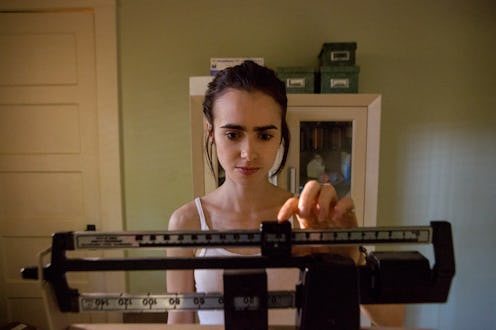Entertainment
'To The Bone' Is A Harrowing Tale Of EDs

I recently learned a sobering fact: according to the National Eating Disorder Association (or NEDA), 20 million women and 10 million men will struggle with an eating disorder at some point in their lives. To The Bone, a Netflix original film which premieres on July 14, seeks to tell the story of just one of those many people. The film follows the struggles of Ellen (Lily Collins), a young woman whose anorexia has spiraled out of control. This subject is distressing for anyone to watch, but it hits especially close to home for the writer and director of the film, Marti Noxon, as To The Bone is based on the true story, partially, of her struggles with anorexia.
Noxon, who has had a long career in television and film, spanning from Buffy the Vampire Slayer to the upcoming HBO series Sharp Objects, has been candid about her battle with addiction and anorexia. The director recently spoke about her struggles with Refinery29, saying:
To be perfectly candid I was struggling. My eating disorder morphed into an issue with alcohol and I got sober when I was 24, and then guess what? I thought I got better, and gave [drinking] another run right after I turned 50. I was aware that I needed to stop and I’d gone back into therapy for it, but I was still really struggling with addiction when I was writing the script. I was really working hard to ask myself why I would pick something up again that had done me harm in the past. I started to draw the parallels to when I was using food to try to control my life and I was able to understand that, even though [anorexia and substance abuse] work really differently, the goal was the same, which was to numb my feelings.
Small details of Noxon's experiences have been included in the film, such as the fact that both Noxon and Ellen's mothers came out as lesbians later in life. Though in regards to the general arc of the story, it's unclear how many of the specific events of the film are pulled directly from Noxon's own life, the director certainly used her own experiences with anorexia to accurately and sensitively portray how a girl struggling with an eating disorder might feel and behave.
Yet Noxon didn't limit the boundaries of the film to encompass only her story. Actor Lily Collins, who plays protagonist Ellen in the film, also has a history of struggling with anorexia, and her participation in the project lent a collaborative effort to the story. IndieWire reported how the experiences of Collins and Noxon were combined to create To The Bone:
Once Collins came aboard, Noxon and her lead actress worked together to build out Ellen from their own experiences. “She was massive on collaboration,” Collins said. “If there were any ideas that I had of my experiences, I would say, ‘Oh, well I didn’t used to do this, but this was something I used to —’ and then, you would mold it. It very much captured most of my essence.”
Though the film draws inspiration from the lives of Collins and Noxon, the director was quick to express in a recent statement on her Twitter account that Ellen's story is not meant to represent the experiences of all people who have suffered from an eating disorder. Noxon wrote:
In an effort to tell this story as responsibly as we could, we spoke with other survivors and worked with Project Heal throughout production in the hopes of being truthful in a way that wasn't exploitive. That said, it's important to remember that each person's battle with EDs is unique and To The Bone is just one of the millions of ED stories that could be told in the US at this very moment.
Despite these cautionary measures, the film has still sparked controversy for its potential glamorization of eating disorders. Some survivors have noted that the film could be potentially triggering for many viewers, or serve as inspiration for people who are susceptible to risky eating behaviors.
Critics and supporters still haven't reached a consensus on this issue, especially as the film has yet to be released. But whether or not To The Bone will be well received by all, most people can agree that it took courage for Noxon and Collins to share their struggles with eating disorders with the public. Hopefully, their stories will contribute to efforts to de-stigmatize a mental health issue that affects so many, but is so rarely talked about.